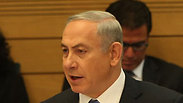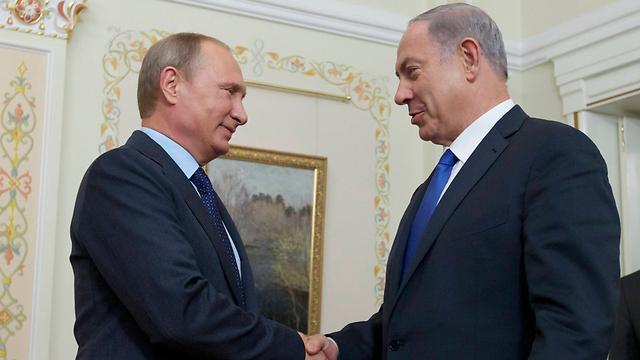
Netanyahu addresses question on gas deal at the Knesset's Economic Affairs Committee, Tuesday
צילום: דוברות הכנסת
Netanyahu's outline: A non-liberal democratic state
Op-ed: Israel's undisputed leader is on his way to becoming a sole ruler, and the Israeli democracy machine appears to have no ability to curb his ambitions; the opposition is weak and the people want a tsar.
The gas deal discussion held Tuesday at the Knesset's Economic Affairs Committee forced Prime Minister Benjamin Netanyahu to do something he isn't so fond of doing: dealing with annoying questions in Hebrew.

The gas deal has succeeded in sending a stubborn handful of Israelis out to the streets. They believe that unlike the issues of state security and the diplomatic vision, which Netanyahu is tightly holding onto, the gas deal is something they may be able to influence. Unfortunately, I don’t share this feeling. The gas deal is over and done with, and if anyone needs proof they should review the prime minister's remark: "When I want something, I get it."
Netanyahu, at the moment, is an undisputed leader and on his way to becoming a sole ruler. It seems that the Israeli democracy machine has no ability to curb his ambitions. His moves are open and his intentions are unconcealed. His decision to hold onto the communications portfolio, in addition to the premiership, is not coincidental. A centralized rule narrows freedom of expression and ensures favorable media coverage.
Netanyahu kept the Foreign Ministry as well in order to restrict the power of Ministers Yisrael Katz and Gilad Erdan. He gave the defense portfolio to the less threatening Moshe Ya'alon. But setting the policy or the lack thereof is in the prime minister's hands. Netanyahu is not interested in the economy portfolio, but once Aryeh Deri began choking, he was forced to add it to his collection too.

If we look at the political culture which produced Putin and compare it to voices from the Israeli street, we discover that the distance between Moscow and Jerusalem is much shorter than 2,640 kilometers (Photo: AP) (צילום: AP)
Netanyahu's PR arm, Energy Minister Yuval Steinitz, referred to the protestors against the gas deal as "anarchists" and it's no coincidence that he sounded just like the Turkish prime minister, President Recep Tayyip Erdogan's yes man. In addition, the toolbox aimed at bolstering the prime minister's standing includes laws in different stages of legislation, like the one which will allow politicians to select judges or the NGO law.
Add to that the weak opposition and a broad public which promises to vote for Bibi in any event, and you get the "Netanyahu outline" - a non-liberal democratic state. It turns out that there is such a thing, and it exists in Russia for example. If we look at the political culture which produced Russian President Vladimir Putin and compare it to voices from the Israeli street, such as "only Bibi" and "leftist traitors," we discover that the distance between Moscow and Jerusalem is much shorter than 2,640 kilometers.
Michael Philipov, a political science doctoral candidate from the Hebrew University, argues in his paper "Who wants a strong leader" that the post-Soviet citizen sees the democratic regime differently from the acceptable Western perception.
In the eyes of many Russians, there is no contradiction between the state's democratic conduct and the centralized government, which always knows what is best for its people. In the traditional Russian dream, a "righteous tsar" protects his people from external and internal enemies, takes care of the ordinary citizen and solves problems in the country in a firm, quick and efficient manner. And if the ruler ignores the rights of the individual on the way, ensures favorable media coverage and often harms his rivals, that does not overshadow his advantages.
In today's Israel, a large public sees no contradiction between democratic conduct and the increase in the power of a leader who is already eyeing a fourth consecutive term. The opposition is weak and the people want a tsar. The "anarchists" do include leftists, but it turns out that they also include naïve right-wing voters who don’t share the prime minister's opinion and fail to realize that the Likud is Netanyahu, and that soon the state will be Netanyahu.
"I don’t like my country the way it is. I do like it the way it was perceived by the founding fathers, the way it tried to be, the way it should and can be," wrote Yossi Sarid, the last of the Mohicans of the Left. His departure may symbolize the death of the Israeli Left as well as the beginning of the end of the democracy built by the founding fathers.










